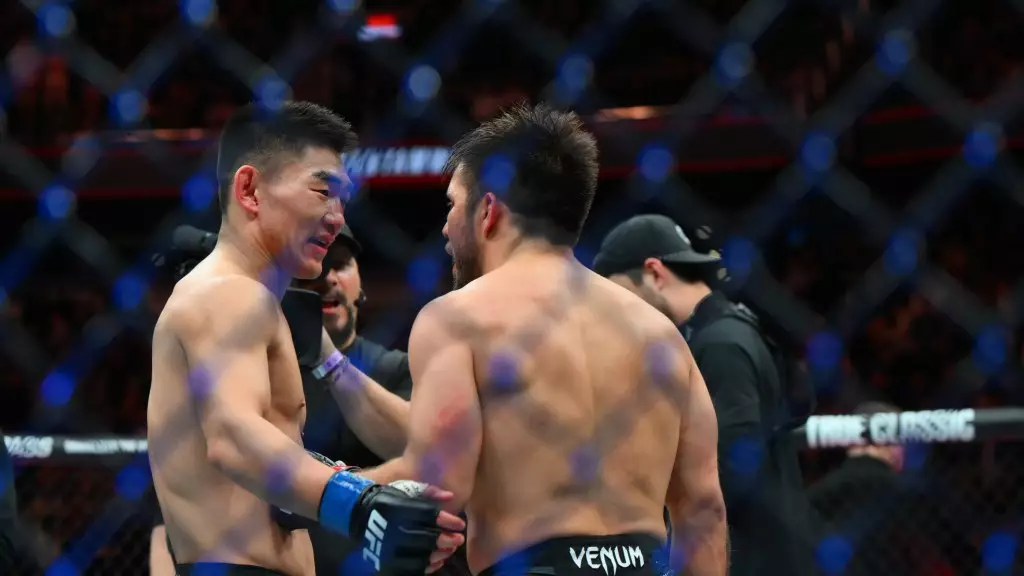In the volatile world of mixed martial arts (MMA), few narratives generate as much intrigue as a fighter’s fall from grace followed by their fervent desire for redemption. Henry Cejudo, a former two-division champion, now finds himself in this precarious position after suffering an uncharacteristic third consecutive loss. The loss, which came at the hands of Song Yadong at UFC Fight Night 252, has ignited a fervent discussion about rematches and the circumstances that surround defeat in competitive sports.
The bout at Climate Pledge Arena in Seattle culminated in a technical decision, which many believe was marred by conditions outside the fighters’ control. Cejudo (16-5 MMA, 10-5 UFC) claims he lost his ability to see after receiving an inadvertent eye poke from Song (22-8-1 MMA, 11-3-1 UFC) during the third round. Cejudo’s assertion raises key questions about the fairness of the match result. The ASPIRE principle in sports ethics emphasizes that outcomes should reflect the true abilities and efforts of competitors, and Cejudo’s grievance suggests that the unwarranted influence of an accidental foul may have tainted the fight’s integrity.
Cejudo has vocalized his dissatisfaction on social media, insisting that the fight should be reset due to the circumstances of his injury. His contention — that neither he nor Song emerged victorious — reflects a growing sentiment among athletes regarding the need for accountability and clarity from officials. This unique situation, where the fighter’s competency is directly impacted by an accidental foul, requires deliberation from both the UFC and its leadership regarding potential rematch scenarios.
Cejudo’s call for a rematch is not just an emotional response from a fighter grappling with a potential career downturn; it is also a strategic move in understanding MMA dynamics. With the current state of the bantamweight division, where fighters regularly rotate in and out of title contention due to losses, a quick rematch could not only provide Cejudo with a chance to clear his name but also a pathway back to prominence within the sport. His social media message, directed at UFC CEO Dana White, is indicative of an athlete who refuses to concede defeat, urging promotions to reconsider the nuances of fight outcomes.
While the UFC has their rankings and procedures that govern fight orders, the question emerges: How much weight should these curious circumstances carry? Fans and analysts alike express interest — and legitimate concern — over the potential for Cejudo to solidify this claim of injustice by confronting Song in an immediate rematch. Such an encounter would not only satisfy the fighters’ competitive instincts but also cater to the thirst for resolution among the fight community.
Both fighters, Cejudo and Song, have expressed a willingness to engage in a second bout. This mutual interest offers an opportunity for the UFC to capitalize on the narrative developed from their first clash. Song, a fighter who has demonstrated resilience and skill throughout his career, currently stands at a pivotal moment in his journey. Securing a fight against a high-caliber opponent like Cejudo could elevate his status in the UFC rankings, benefitting his career trajectory significantly.
Cejudo’s previous achievements — as a two-division champion — give credence to his insistence on a rematch. Athletes who have achieved similar accolades often find themselves in the spotlight, where not only their skill but also their resilience is tested. As Cejudo grapples with the implications of his three-fight skid, the rematch would serve as a barometer to measure his competitiveness against both Song and the weight of mental and physical adversities he’s faced.
In the grand scheme of MMA, fighter narratives do not merely circle around wins and losses; they reflect the emotional and psychological stakes that come with each performance. Cejudo’s case exemplifies the broader challenges within competitive sports — the intersections of ethics, athlete welfare, and promotion dynamics. The push for a rematch captures the essence of what makes MMA uniquely captivating: the unpredictability of outcomes and the intense human element involved.
Ultimately, whether the UFC decides to grant Cejudo’s request remains to be seen. However, one thing is clear: the lingering questions surrounding his last bout will not disappear until there is a definite resolution. The stakes are high, both personally for Cejudo and professionally for Song; thus, the call for a rematch reflects the underlying ethos of competition itself — the desire for fairness, justice, and the relentless pursuit of excellence.

